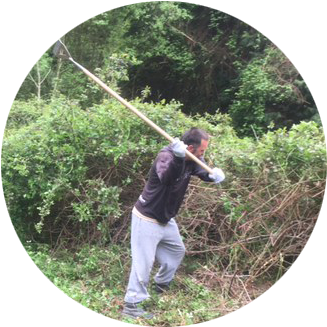Conservation Work
At the heart of what we do at The Worcestershire Woodland Project is conservation and bio-diversity. We don’t just chop down trees for the fun of it -although we do have great fun doing it!
When woodlands are not managed, they develop a closed canopy which blocks out the sun making the woodland dark and cold. Coppicing makes room for the sun to shine through and create the right conditions to encourage back wonderful woodland flowers and for new trees to germinate.
Poor woodland management is one of the reasons that one in every six woodland flowers is close to extinction! With less wild and woodland flowers, we have less bees and other important pollinating insects. Without bees and other pollinators, we would have less variety of foods available to us humans, as some crops can only survive by pollination.
But it’s not all about new growth! Woodlands are the richest and most diverse habitats on land. They support thousands, probably millions, of insects and invertebrates that live among the leaves, under bark, in dead wood and on the woodland floor. Ancient trees are as equally important to the bio-diversity of the woodland as new trees. An ancient tree means that is in the last stage of its life cycle. The fact that they are in the process of decline and decay means there are plenty of nooks and crannies for wildlife to live and thrive. The hollowing of trees by fungi creates habitats for a variety of wildlife species. The fruiting bodies of fungi also provide food for red squirrels, badgers, wood mice, and some beetles and slugs.
During our time at Churchill wood we have seen an increase in native bluebells as well as in robins, thrushes and voles.
Churchill wood has been in existence for hundreds of years and The Worcestershire Woodland Project wants to make sure it is around for hundreds more!
We have also recently begun a planting project with the Heart of England Forest. The Heart of England Forest is a charity committed to helping reverse centuries of woodland decline by planting a 30,000-acre joined up forest of entirely native broadleaf trees. We also take part in grounds conservation at National Trust Croome, nr Pershore.

FACT: Every one of us can help prevent the decline of woodland flowers and wildlife habitats by buying locally sourced coppice products.



